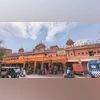On Wednesday evening, on the last day of the election campaigning on the 12 of Rajasthan’s 25 Lok Sabha seats, its capital city was wrapped in the fervour of celebrating Ram Navami.
In Rajasthan, where communities and villages have traditionally had their own deities, devotees thronged Ram temples, while streets and markets of Jaipur buzzed with ‘shobha yatras’, people queuing up for food distributed at ‘bhandaras’ and playing of ‘bhajans’ on loudspeakers.
The city's streets were plastered with posters marking Ram Navami, which were mostly sponsored by sundry affiliates of the Vishva Hindu Parishad (VHP), which had led the Ram Janmabhoomi movement. The VHP’s headquarters in the city organised a ‘shobha yatra’, a road show, on Wednesday.
Some of its members this newspaper spoke with, alluded to the ‘pran pratishtha’ (consecration) of Rama’s idol at the temple in Ayodhya, to say “Ram’s time has come”.
On Ayodhya’s Ram Mandir weighing on the elections, one repeated a line from Goswami Tulsidas' Ramcharitmanas – ‘Hohi wahi jo Ram rachi rakha’ (Only that will happen what Ram has written).
The devout milled around in temples adorned with idols of Ram, Sita-Ram and the Ram Darbar. Inside Jaipur’s walled city, in the 128-year-old Thikana Shri Ram Temple at Chandpole, a devotee said he has been visiting the temple for over two decades but has never met such a multitude of people.
More From This Section
Inside the temple premises, there were more posters and banners announcing the holding of Shobha Yatras and Bhandaras on the occasion of Ram Navami.
The catchy ‘Ram Aayenge’ song played on loop with some devotees dancing to it. Saffron flags, a common sight across northern India after the inauguration of the Ram temple in Ayodhya, fluttered from the temple’s tall outer wall. The temple is said to have been constructed by Rani Gulab Kanwar, wife of Raja Sawai Mansingh.
“Shri Ram bhakti is in vogue now, as was the devotion for Sai Baba some years back. But Shri Krishna has been the main deity in these parts. But now people are flanking the Ram temples in the last couple of years, especially after 22 January,” a shopkeeper, who plies his trade outside the temple, chuckled.
He added that is a “proud” Hindu and commerce-oriented areas of Rajasthan, such as Jaipur, usually don't mix religion with their political preferences.
Jaipur’s walled city where this temple is situated has close to 80 small or big temples. The area is filled with marble shops specialising in idols of various Gods. Has the sale of Ram idols gone up? “There is some interest. People want for gifting but if you mean bulk orders, then no,” a trader who deals in the sale of marble artefacts said. Near the temple, another visitor said he visited the temple for the first time to imbibe the excitement.
But will Ram Navami set the tone for the election? And help BJP script the previous success?
In 2019, the BJP had swept Rajasthan, winning 24 with ally Rashtriya Loktantrik Party’s (RLP) Hanuman Beniwal winning the Nagaur seat. But this time, Beniwal is in Congress’ camp. While his opponent from five years back, Jyoti Mirdha, is now in the BJP.
Of the 12 BJP MPs replaced from 2019, nine are on seats scheduled for polling on April 19. From Alwar, the BJP has fielded Union minister Bhupender Yadav, who was a Rajya Sabha MP, and is now contesting in place of Mahant Balaknath, now a legislator.
Arjun Ram Meghwal is another Union minister in the fray who will be defending his Bikaner seat.
Apart from Alwar, the BJP has replaced its sitting MPs on Jhunjhunu, Dausa, Karauli-Dholpur, Ganganagar, Bharatpur, Churu, Jaipur Rural and Jaipur city seats.
The Congress, which lost the Rajasthan Assembly polls in December by a little over two per cent vote share, is hopeful of doing better on seats where it performed well four months back.
In the Assembly elections, the BJP fielded six of its MPs, of which only three could win.
In the Shekhawati region, the Congress won 16 of the 24 seats spread across its three Lok Sabha seats.
This time too, the Opposition alliance, led by the Congress, expects a good showing in the region, which goes to polls on April 19. Churu, a constituency of the region, recently saw its BJP MP Rahul Kaswan crossing over to the Congress.
And the party is now supporting the CPI (M)’s farmer leader Amra Ram on the Sikar seat.
The BJP, however, is confident that its committed cadre, polling booth management and Prime Minister Narendra Modi’s magic would overcome any constituency-specific challenges.
But does that mean that Lord Ram and the ‘pran pratishtha’ would also influence voting behaviour?
“It is difficult to say. In the cities people know what bhakti actually is, what is gimmick and electing which leader will benefit them. This is a ‘businesswala’ attitude that this city has,” a shopkeeper, who plies his trade outside a temple in Jaipur, said.
His companion added that the issues are unique which have no bearing with the religion.
“But the clarion call of the ruling party of ‘Hindu jaago’ is working. The Muslim community is side-lined. It makes us proud but doesn’t solve our problems,” he said.
Another shopkeeper in Jaipur’s Chandpole area, however, interjected to say that at the end of the day only business matters.
He pointed towards a blue board just some meters away. It declared Kishanpole legislative assembly area. MLA: Amindudin Kagzi, Indian National Congress.
(With inputs from Archis Mohan in New Delhi)

)
